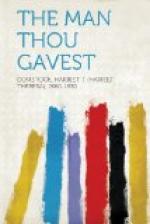But Ann did not die. Slowly, almost hesitatingly, she turned back to them and brought a new power with her. She, apparently, left her baby looks and nature in the shadowy place from which she had escaped. Once health came to her, she was the merriest of merry children—almost noisy at times—in the rollicking fashion of Betty’s irrepressible Bobilink. And the haunting likeness to Truedale was gone. For a year or two the lean, thready little girl looked like no one but her own elfish self; and then—it was like a revealment—she grew to be like Nella-Rose!
Lynda, at times, was breathless as she looked and remembered. She had seen the mother only once; but that hour had burned the image of face, form, and action into her soul. She recalled, too, Conning’s graphic description of his first meeting with Nella-Rose. The quaint, dramatic power that had marked Ann’s mother, now developed in the little daughter. She had almost entirely lost the lingering manner of speech—the Southern expressions and words—but she was as different from the children with whom she mingled as she had ever been.
When she was strong enough she resumed her studies with the governess and also began music. This she enjoyed with the passion that marked her attitude toward any person or thing she loved.
“Oh, it lets something in me, free!” she confided to Truedale. “I shall never be naughty or unkind again—I wouldn’t dare!”
“Why?” Conning was no devotee of music and was puzzled by Ann’s intensity.
“Why,” she replied, puckering her brows in the effort to make herself clear, “I—I wouldn’t be worthy of—of the beautiful music, if I were horrid.”
Truedale laughed and patted her pretty cropped head, over which the new little curls were clustering.
Life in the old house was full and rich at that time. Conning was, as he often said, respectably busy and important enough in the affairs of men to be content; he would never be one who enjoyed personal power.
Lynda, during Ann’s first years, had taken a partner who attended to interviews, conferences, and contracts; but in the room over the extension the creative work went on with unabated interest. Little Ann soon learned to love the place and had her tiny chair beside the hearth or table. There she learned the lessons of consideration for others, and self-control.
“If the day comes,” Lynda told Betty, “when my work interferes with my duty to Con and Ann, it will go! But more and more I am inclined to think that the interference is a matter of choice. I prefer my profession to—well, other things.”
“Of course,” Betty agreed; “women should not be forever coddling their offspring, and when they learn to call things by their right names and develop some initiative, they won’t whine so much.”
Lynda and Truedale had sadly abandoned the hope of children of their own. It was harder for Lynda than for Con, but she accepted what seemed her fate and thanked heaven anew for little Ann and the sure sense that she could love her without reserve.




